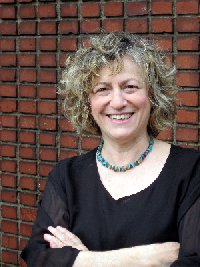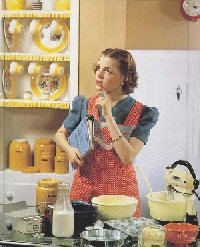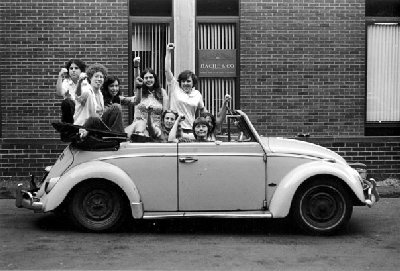LEAH MARGULIES - CIVIL RIGHTS, FEMINIST AND ANTI-CORPORATE ACTIVIST, FOUNDING MEMBER OF THE NEW HAVEN WOMEN'S LIBERATION ROCK BAND AND MOVEMENT, LAWYER, SINGLE MOTHER  I was born in New York City on April
12, 1944 into a Socialist family. When I was three we moved to a rural town in Massachusetts where we were the
only Jewish family. It was right after the war and news of the Holocaust was emerging, so early on I was aware
of the deadly aspects of discrimination. My family moved to New Rochelle, NY in 1950. I was born in New York City on April
12, 1944 into a Socialist family. When I was three we moved to a rural town in Massachusetts where we were the
only Jewish family. It was right after the war and news of the Holocaust was emerging, so early on I was aware
of the deadly aspects of discrimination. My family moved to New Rochelle, NY in 1950.When I was nine I had a life changing experience. It was 1953 and we drove through the Jim Crow South to Hollywood, Florida . I was overwhelmed by the poverty—black people living in shacks with newspaper walls and corrugated iron roofs, tilling fields by hand or with a mule. The “whites only” gas-station toilets and water fountains shocked me. This experience influenced the rest of my life. When I was 15, I went south with the American Jewish Society for Service to work at what had been a school for blacks after the Civil War in the the Georgia Sea Islands. It was 1959; soon it would be too dangerous to send NY teenagers into the South to work for integration, but I ended up spending the 1960 summer as a Junior Counselor for a tiny Quaker camp in the mountains of North Carolina. We were part of a small group of children (12–16 years old) that integrated (temporarily probably) the local movie theater—we walked in all holding hands.  When I started college in 1962 girls weren’t allowed to wear pants except in 15 degree or below weather. By that time I was an activist and before long became a feminist but didn’t really know it. In sophomore year, along with 22 other women at Boston University. I lived in the French Dorm. It attracted, a group of girls who wanted to speak French as part of dormitory life; we were not interested in sororities and fraternity parties but in civil rights, student rights, and later antiwar demonstrations. Being part of a group of strong, defiant women was what I wanted, but it still didn’t have a separate consciousness for me. So, what does a girl without any real direction do after college? In 1968 I got married to someone who was a draft resister and draft counselor. By this time, one of my friends from BU graduated and moved to NY where she got involved with "Citywide," one of the first women's liberation groups in NYC. She tried to recruit me but I was leaving for New Haven—my husband was starting grad school at Yale. I went to my first consciousness-raising meeting there in December ’68 and talked about the time a boyfriend in high school told my mother I should be a lawyer because I argued so strenuously. My mother’s response: “That’s ridiculous, she’s going to be a housewife!” When I got home from the CR meeting I woke my husband. “This is where I’m going to be for the rest of my life,” I said, “and I want to play flute!” Later, a small group of us began to jam. By September ’69, the first group of women came to Yale, bringing Kit McClure, a real rock musician. Florika, a child prodigy violinist ready to play bass, was already in New Haven. Judy literally needed to play drums and Ginny was a skilled horn player. I was a rank beginner, but with several others we started the New Haven Women’s Liberation Rock Band. Over the next four years we played in front of the Capitol for the first National Abortion March; at Niantic Prison where the Black Panther women were in jail. We played at Cornell—and needed a police escort out of Ithaca because the men were furious that the women wouldn’t let them come into the dance. Often we would lead workshops—why we needed to change the misogynistic rock world, and we would teach rudimentary skills to demonstrate that any woman could learn to play. Together with the Chicago Women’s Liberation Rock Band, we recorded an album, “Mountain Moving Day.” At the same time, my political education expanded. The husband of one of my friends was a political economy professor at Yale. In mid ’69 he called my house to offer a researcher job to my husband. I answered the phone, and I told him —“That’s so sexist, offering the job to my husband; he doesn’t want or need a job but I do!” I was hired on the spot.  Thus began my education about multinational corporations, their global reach and transcendence over nation-states. After forming a research collective and producing a reader on corporate expansion (this was later “appropriated” by the Institute for Policy Studies into their book, “Global Reach”), Judy and I started the Women’s Research Project. We led workshops, created slide shows and wrote articles about everything from the way advertising socialized and portrayed women to the global expansion of consumer markets into Third World countries—controlling political revolution through the consumer products revolution. As a result of all of this, my marriage split and Kit McClure and I formed the first all-women’s living collective in New Haven. In 1974, a group of us left the band and moved to NYC to join an alternative lifestyle community which developed a political theatre company, where I continued to play rock music. Also that year I was hired as a fact checker for “Hungry For Profits,” a book of case studies of exploitation by food and drug corporations in Latin America. Here I learned for the first time about the deadly marketing practices of the baby formula companies in Third World countries.
Soon after, I was hired by the Interfaith Center on Corporate Responsibility to develop programs around world hunger. We challenged the marketing practices of the US-based infant formula companies and soon we were in a lawsuit against Bristol Myers, makers of Enfamil. (The problem: infant formula companies aggressively market powdered formulas in Third World countries to mothers who can’t possibly use it safely since you need clean water, refrigeration, know how to sterilize, etc. The result—infant malnutrition and death.) Nestle was the biggest offender, so in summer 1976 I proposed to the European activists a boycott of Nestle—they said No, you have to do it in the US. I recruited a few other believers, started INFACT, and Infant formula Action Coalition. and in July 1977 we launched the Nestle Boycott. That resulted in the UN adopting a code of marketing (WHO/UNICEF International Code of Marketing of Breast Milk Substitutes) to attempt to control this industry. The boycott in the US ended in 1984, but It continues to this day in many parts of the world. My work on the Code resulted in my decision to go to law school, defying my mother’s prediction. After graduation in 1985 I became a legal aid lawyer (5 years); helped start an Environment program at the UN Centre on Transnational Corporations, and started a legal office at UNICEF to put into national law the Code of Marketing adopted in 1981. By this time, despite never marrying again, my greatest desire was to become a mother. I decided to adopt and in September 1991 my dream came true. I had put an ad for a baby in a college newspaper and 3-½ weeks later my son was in my arms! His birth mother and her sister chose me over several married couples because they had boycotted Nestle as children. Ryan is now 19, and an accomplished drummer, artist and skakeboarding videographer.
In 2006 I was hired by a consortium of legal aid organizations, pro bono groups and Bar associations to lead New York State’s legal aid Internet portal, LawHelp.org/NY. We have grown enormously, serving hundreds of thousands of low income New Yorkers. By the end of 2010 we had about 465,000 visitors viewing 3.5 million pages of civil law information such as how to fight an eviction case, get an order of protection in a domestic violence situation, or challenge a default judgment in a consumer credit lawsuit. Because of this work, I was honored in November 2010 as a Purpose Prize Fellow for being a “social entrepreneur” as a senior. I remain active in challenging corporations—I’m on the Board of Corporate Accountability International (formerly Infact), and we are currently challenging big tobacco, working to ensure public funding for our public water systems and challenging corporate control of food. (We helped the San Francisco Supervisor win the vote in early November to end toy giveaways for children’s fast food meals.) And I’m a member of the Program Committee of the American Friends Service Committee’s Nationwide Women’s Program. In October 2010 I joined the Brooklyn Women’s Chorus, led by Bev Grant. with whom the New Haven Women’s Liberation Rock Band performed in the ’70s. To put it mildly, my life was transformed by the Women’s Liberation Movement, by feminism. I am living proof that Sisterhood Is Powerful. Contact Leah Margulies: leahmargulies@gmail.com Comments: jcvfa@aol.com Back to VFA Fabulous Feminists Table of Contents |

